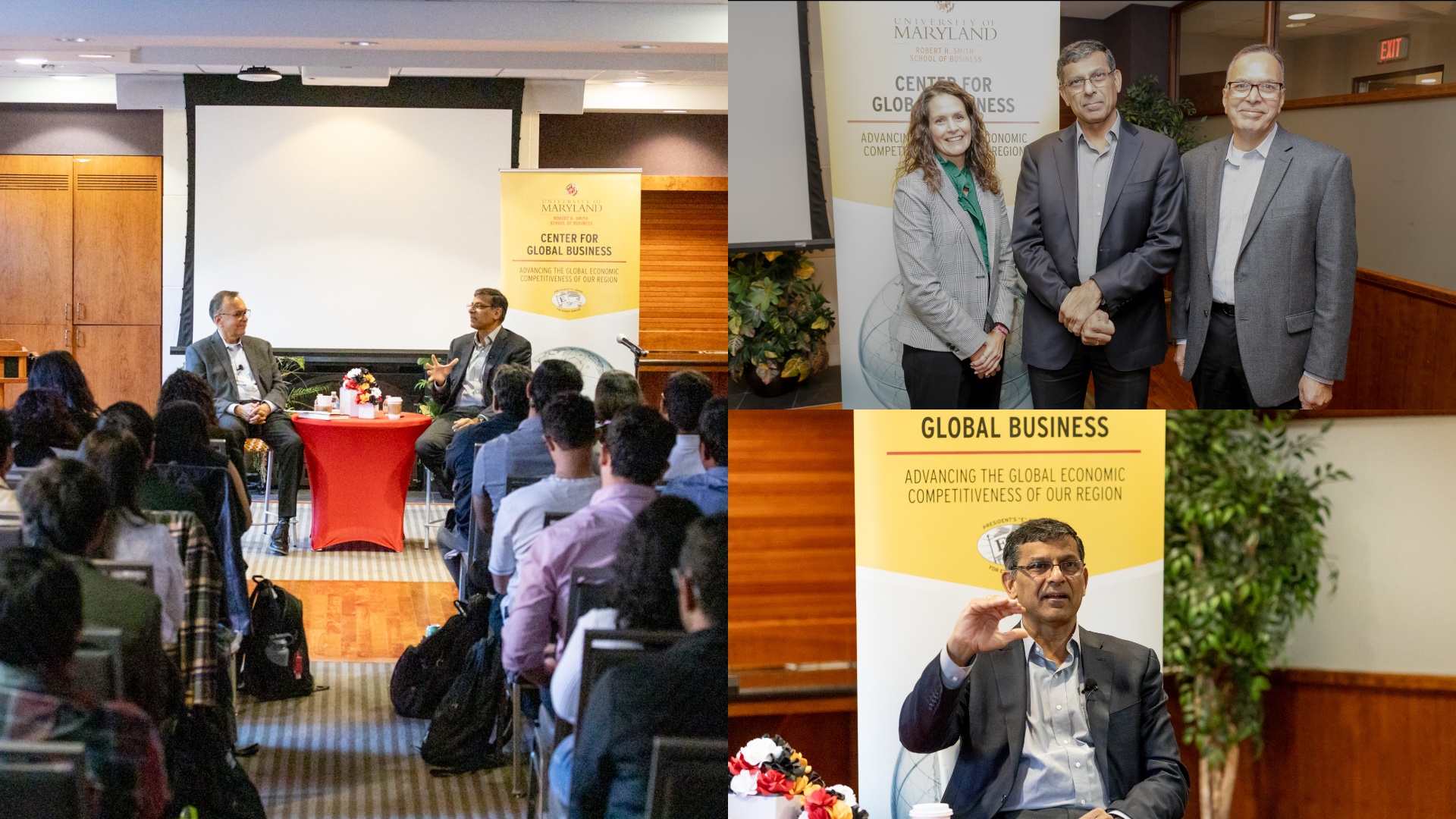
As the seventh largest country in the world and the fastest-growing economy, India was the topic of discussion in the latest Center for Global Business (CGB) Distinguished Speaker in International Business Series (DSS) event. The center welcomed Dr. Raghuram Rajan, author of “Breaking the Mold: India’s Untraveled Path to Prosperity.”
“India holds a very important place here at the Smith School and indeed the world,” said Rebecca Bellinger, executive director of CGB. She highlighted the importance of India as the world’s fastest-growing economy and major trade partner for the U.S.
Rajan is the Katherine Dusak Miller Distinguished Service Professor of Finance at Chicago Booth. He was the 23rd Governor of the Reserve Bank of India between September 2013 and September 2016. He also served as the Chief Economist and Director of Research at the International Monetary Fund between 2003 and 2006.
“He’s one of the most distinguished scholars of his generation in economics and finance, but what I find particularly admirable about Dr. Rajan is how he has combined that with his career in public service,” said Kislaya Prasad, CGB’s academic director.
Rajan began the discussion by highlighting India’s economic growth from about 6.5% to 7% over the last 3 to 4 years. “Very few countries have matched that.” In order to sustain the growth, one area India has to focus on according to Rajan is job creation for India’s population.
“Our weakness is human capital, regardless of whether we want to do more manufacturing or services. We need to improve the quality of human capital,” he said. Focusing on improving human capital is particularly important according to Rajan for India to achieve its goal of becoming a developed country by 2047.
Rajan said a new opportunity for job growth is in moderately skilled services and creating opportunities to “train people up” to the next skill level and be “open to the fact that the leading export sector of our economy will not be low-skilled manufacturing but can very well be high skilled services.”
Innovation and creativity are other areas that Rajan highlighted as an important factor in driving India’s economy. He said in order to become developed in 20 years, India needs to create a research ecosystem.
“We have plenty of faculty across the world,” he said. “We don’t have a program to bring them back to India.” Rajan said if they make it easy to get the diaspora back, India will then have the people and ideas to help “fertilize” the innovation ecosystem.
When asked by Prasad why Rajan thinks democracy is a “crucial ingredient” to creating an innovation-driven economy, Rajan said one reason is democracy “gives us the opportunity to challenge, to ask questions, to argue” which he says is very important for “intellectual property, creation and creativity.”
The book, Rajan said, was written “in record time” to try to get it out before the Indian elections. “We thought it was important to put a game plan out there as to why preserving democracy, preserving the Constitution, was so important.”
The center is working on programming to support the bilateral agreement between the U.S. Small Business Administration and India’s Ministry of Micro, Small and Medium-Sized Enterprises, to open opportunities for each country’s smallest businesses to participate in the global marketplace. “This is a brand new agreement and the center is working to be at the ground level to make it possible,” Bellinger said. CGB is also working with the Maryland Department of Commerce’s Global Gateway program to bring “foreign direct investment from India directly to Maryland.” She added these programs also bring opportunities for students to get involved as well.
The DSS is supported in part by CIBE, a Title VI grant provided by the U.S. Department of Education.
Media Contact
Greg Muraski
Media Relations Manager
301-405-5283
301-892-0973 Mobile
gmuraski@umd.edu
About the University of Maryland's Robert H. Smith School of Business
The Robert H. Smith School of Business is an internationally recognized leader in management education and research. One of 12 colleges and schools at the University of Maryland, College Park, the Smith School offers undergraduate, full-time and flex MBA, executive MBA, online MBA, business master’s, PhD and executive education programs, as well as outreach services to the corporate community. The school offers its degree, custom and certification programs in learning locations in North America and Asia.